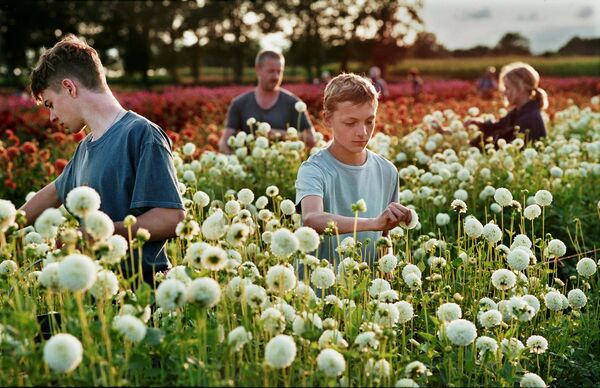Eye For Film >> Movies >> Close (2022) Film Review
Close
Reviewed by: Amber Wilkinson

It is highly appropriate that a note during the credits from the director Lukas Dhont thanks “all the people around me during making Close” since this film is constructed around the idea of those who are near to us. Also, despite having a tragedy contained within it, this is chiefly a film about the importance of love and understanding.
Dhont’s drama - which shared Cannes’ Grand Prix with Claire Denis’ Stars At Noon this year - also celebrates childhood imagination. It’s that which is one of the shared joys of the friendship between Léo and Rémi (impressive newcomers Eden Dambrine and Gustav De Waele). It’s there in their games as they tackle life at the gallop, in their hopes for the future and in the stories Rémi sometimes tells his pal when he can’t sleep.

They are close in that easy way that comes from years of friendship despite being just on the cusp of adolescence. Their shared universe is one thing but the world of high school is quite another and it’s here that the trouble starts. Dhont, like fellow Belgian director Laura Wandell (Playground), has a feel for the way children are shaped by this experience. Although his incarnation of school is not overtly hostile, he shows how youngsters face challenges about their identity which adults might take in their stride, but they are encountering for the first time. Thoughts and fears become exaggerated, as Rémi puts it, “It’s just my brain - I can’t stop it.”
This is how a casual question from a classmate puts a seed of concern in Léo’s mind that blooms more quickly than the flowers on his parents farm and into something far more poisonous. As the friendship begins to crumble, there’s a sense of devastation of the sort that, thankfully, most people rarely encounter as adults - but that doesn’t make it any less catastrophic here. Dhont and his co-writer Angelo Tijssens carefully follow what happens next, not just from the perspective of childhood, but also of Léo and Rémi’s mothers Nathalie (Léa Drucker) and, in particular, Sophie (Émelie Dequenne), who is almost as close to Léo as her own son.
There are also sorts of embraces in this film - ones that try to contain haywire energy, others intended to console. Gestures count, whether its a glance of regret or the subtle, almost imperceptible moves a sibling makes to show they care. Loose camerawork from Frank van den Eeden enhances the intimate, raw spirit.
Even when answers are impossible to find, compassion reigns supreme.
Reviewed on: 18 Nov 2022















